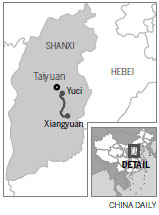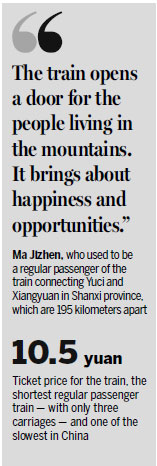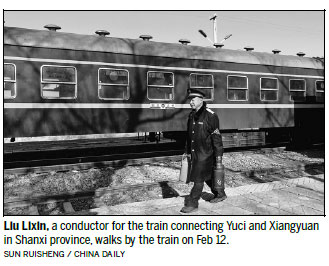With the world's largest and fastest-expanding high-speed railway network, China has updated its railway timetable frequently over the past few years. But the timetable to a passenger train service connecting Yuci and Xiangyuan, two county-level regions 195 kilometers apart in the Tai-hang Mountains in North China's Shanxi province, has remained unchanged since its maiden run a quarter century ago.
Pulled by old fashioned diesel locomotives, the trains shuttling daily along the railway among mountains between the two regions only has three carriages - two for passengers and one for luggage, making it the shortest regular passenger train in China, and it is also one of the slowest, chugging along the line at an average speed of less than 30 km per hour, or one-tenth the bullet train's rate.

The line goes through six counties, home to about 3 million mostly rural residents, and plays an important role in the lives of locals. The train offers a shortcut to the provincial capital Taiyuan, 27 km north of Yuci. Locals call the train the "Taihang bus", and a one-way ticket between Yuci and Xiangyuan is just 10.5 yuan ($1.65), compared to 7.5 yuan 25 years ago.
"Although the train is not fast, it is punctual in almost all weather," said Zhang Bo, head of the passenger service section of the Taiyuan railway administrative department.
"All the counties are accessible via highway now. Nevertheless, the train is cheaper and more reliable though it is always crowded in bad weather," Zhang said.
Almost all the tiny stations along the line are located in highlands near small villages because the line was built in the 1960s with the initial purpose of transporting coal.

"It serves mountain residents directly. They take their millet, dates and walnuts they plant and chicken eggs to the counties to sell and this train is their first choice," Zhang added.
Ma Jizhen of Xiangyuan, who used to be a regular passenger of the train, has increased her income markedly in this way since the train service was launched.
"The train opens a door for the people living in the mountains. It brings about happiness and opportunities," Ma said.
Local government figures show the mountainous region used to be a poverty-stricken area, and most farmers had lived a subsistence-level life for generations. However, over the past 25 years, most of them have bid farewell to poverty.
Accustomed to the clickity-clack lulling people to sleep, Liu Lixin, 52, who has worked on the train as a vendor, attendant and conductor for nearly half of his life since 1993, is familiar with not only every one of the 22 stations, 56 tunnels and 142 bridges along the 195-km line, but also his regular passengers.
"Over 25 years, I saw them grow up from students to businesspeople and professionals, and I also have seen them grow old from parents to grandparents. The train is like a home to me," Liu said.
Liu said many of his older passengers now operate lodging facilities for tourists in the villages, and the carriages are often filled with hikers and backpackers looking for fun in the mountains.
Contact the writers at liyang@chinadaily.com.cn

(China Daily 02/23/2018 page4)